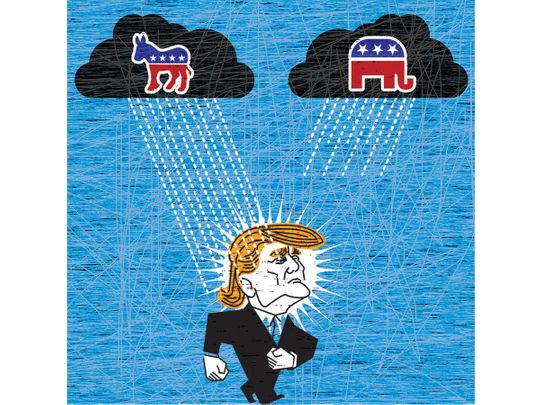
Republicans argue that the present impeachment process in the United States is nothing like Watergate. At that time there was growing bipartisan alarm at President Richard Nixon’s conduct, while the impeachment votes on Friday in the House Judiciary Committee were strictly along party lines.
Indeed, some Democrats may vote against impeachment in the full House while Republicans will be united, practically smothering President Donald Trump in their embrace. Some will argue that the opposition to impeaching Trump is more bipartisan than the effort to oust him.
“This is the fastest, weakest, thinnest, MOST PARTISAN impeachment in American presidential history,” said Rep. Matt Gaetz, promptly retweeted by the president.
Yet that is, I think, a misreading of history. The essential difference between Nixon and Trump lies not in their misconduct or in their unsuitability for office but in the grim refusal of today’s Republican Party to notice wrongdoing and its determination to stand by Trump come what may.
I worry about the political consequences of impeachment but still favour it as a way to create accountability and establish norms against abuses of power to interfere in elections.
What’s different today is not the abuse of power by a rogue president but his party leaders’ shortage of principle. That in turn flows partly from the pernicious influence of Fox News, which enables a Trumpian ecosystem that is largely impervious to facts.
In a narrow sense, this blinkered approach may succeed politically for the Republicans. I suspect that to some swing voters, this may look like nothing more than one more Democrat vs. Republican food fight and a distraction from substantive issues.
Democrats dominated the impeachment process until now and unearthed important new information implicating Trump — yet the polls barely budged. Indeed, one new poll (by a Republican-affiliated firm) shows Trump in the crucial states of Michigan, Pennsylvania and Wisconsin. And when the impeachment effort reaches the Senate, it will be Republicans in the driver’s seat.
In 2016, the Brexit vote in Britain was a harbinger of Trump’s election as president. There are many differences, but Boris Johnson’s ability as a deeply flawed conservative to win a solid majority in Thursday’s British elections, including many working-class voters, is sobering for Democrats.
Yet back in the United States, put aside the politics and look at the merits of the impeachment cases, and everything looks different.
Clinton misled a grand jury
Republicans said that the impeachment of President Bill Clinton was different because he committed the crime of perjury, even if only about sex. But that’s not clear: A 33-page article in 2004 in the Chicago-Kent Law Review concluded that Clinton misled a grand jury but may have managed through brilliant lawyering to avoid the technical offence of perjury.
Republicans at the time made much of the argument that Clinton’s misconduct made him morally unfit for the presidency. But if that’s the standard for impeachment, then what do we make of a president who is a serial liar, apparently committed tax fraud, has been accused of sexual misconduct by at least 25 women, and paid a porn star $130,000 in hush money to keep their affair from voters? Or who just this month was forced to pay $2 million after “a shocking pattern of illegality” involving the use of his charity to promote his own interests?
As for Watergate, it is easier for the public to grasp a burglary than diplomatic extortion involving Ukraine. But Nixon apparently did not order the break-in; his offence was a cover-up and a systematic effort to manipulate the instruments of federal power to hurt his rivals. Sound familiar?
The big difference is that Trump, shielded by congressional Republicans, has been more successful than Nixon in his stonewalling of investigators. The verb “to stonewall” was popularised in the Nixon era, but in the end he did not go as far as Trump in refusing to cooperate with investigators.
The famous quote that everyone remembers from Watergate (said by a Republican!) is, “What did the president know, and when did he know it?” That was never asked this time around, as Rep. Eric Swalwell has noted, because we largely agree that Trump knew everything from the start. It was Trump himself who pressured Ukraine and, in a rough transcript we have all seen, who asked Ukraine to investigate the Bidens.
Another difference from Watergate is that Nixon’s abuses did not directly damage national security or cost lives. In contrast, Trump’s suspension of vital military assistance may have added to the Ukrainian death toll and certainly helped Russia.
Watergate and Nixon
After the Watergate break-in, there was no immediate epiphany about its seriousness. Nixon was re-elected that fall by a huge margin. A year later, more Americans said they were more concerned by Chappaquiddick (where a young woman in Edward Kennedy’s car drowned) than by Watergate. It wasn’t until just before Nixon’s resignation that a majority favoured his removal from office.
Yet now we regard Nixon’s behaviour with widespread revulsion, and someday I believe we will feel similarly about Trump’s. I worry about the political consequences of impeachment but still favour it as a way to create accountability and establish norms against abuses of power to interfere in elections.
What’s different from Watergate is not the nature of the misconduct but the shamelessness of the defence.
— Nicholas Kristof is an American journalist, author and a winner of two Pulitzer Prizes.










